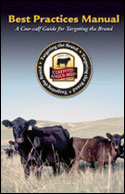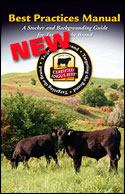Trace Minerals Crucial for Cattle Health
Reproductive performance in cattle, skeletal development in young animals, optimum health, and strong immunity depend on adequate nutrition — which includes important trace minerals. Some soils and plants are short on various minerals, leaving feeds deficient. Ever since the 1950s, cow-calf producers have been aware of problems caused by selenium deficiencies (white muscle disease in young calves, retained placenta and infertility in cows, abortions, premature or weak newborn calves). In most geographic areas of the U.S., soils are deficient in selenium (Se).
Later, U.S. Department of Agriculture (USDA) surveys found copper (Cu) deficiencies were also widespread, resulting in poor hair pigmentation, fragile bones, impaired reproductive performance, poor growth rate and reduced immunity. Copper supplementation on many ranches has improved conception rates and immune responses to vaccinations.
The most recent forage and cattle studies have indicated zinc (Zn) may be the most widely deficient trace mineral. Zinc is important in many body systems including production of certain enzymes (particularly for synthesis of DNA, RNA and proteins), carbohydrate metabolism, hoof structure and soundness, and male fertility (deficient animals have smaller testicles and reduced semen quality).
Zinc-deficient calves may have swollen feet, scaly skin with open lesions, wounds that take longer to heal, loss of hair, excessive salivation, reduced appetite, reduced feed efficiency and growth rates, and impaired immune systems. Moderate deficiencies are not readily recognized, but they do take an economic toll through decreased growth rate and impaired immunity and fertility. Calves born to zinc-deficient dams have lower levels of immunity even when fed adequate amounts of zinc.
Manganese (Mn) is important for proper bone and cartilage formation, which directly affects bone growth in young animals. It is also crucial for optimum fertility in cows. Signs of deficiency in calves include skeletal deformities, swollen joints and stiffness.
During the past two decades, USDA studies of blood levels for trace minerals in cattle herds around the country found numerous animals deficient in these four important minerals. For instance, in 1992, USDA's National Animal Health Monitoring System (NAHMS) checked selenium levels, testing whole blood samples from 2,216 cows and heifers in 253 herds located in the 18 states containing 70% of the U.S. beef cow inventory. In that sampling, 7.8% of animals tested were classified as severely deficient and another 10.4% were marginally deficient. Nearly half of all cattle operations surveyed used supplemental selenium. Percentages of severely deficient cattle were lower in operations that provided supplemental selenium, but there were still some animals that were severely deficient.
 In 1997 USDA's NAHMS collected blood-serum samples from 3,902 animals on 411 operations in 23 states to analyze for zinc content. This study found that 25.6% of cattle operations tested had at least one severely zinc-deficient animal. Overall, 65.9% of operations and 59.7% of cattle tested were considered moderately or severely deficient in zinc. And 77% of forage samples collected were found to have inadequate zinc to meet requirements for beef cattle. Approximately 63% of these operations provided supplemental zinc to their cows, yet some of these animals were still deficient.
In 1997 USDA's NAHMS collected blood-serum samples from 3,902 animals on 411 operations in 23 states to analyze for zinc content. This study found that 25.6% of cattle operations tested had at least one severely zinc-deficient animal. Overall, 65.9% of operations and 59.7% of cattle tested were considered moderately or severely deficient in zinc. And 77% of forage samples collected were found to have inadequate zinc to meet requirements for beef cattle. Approximately 63% of these operations provided supplemental zinc to their cows, yet some of these animals were still deficient.
[Click here to go to the top of the page.]





